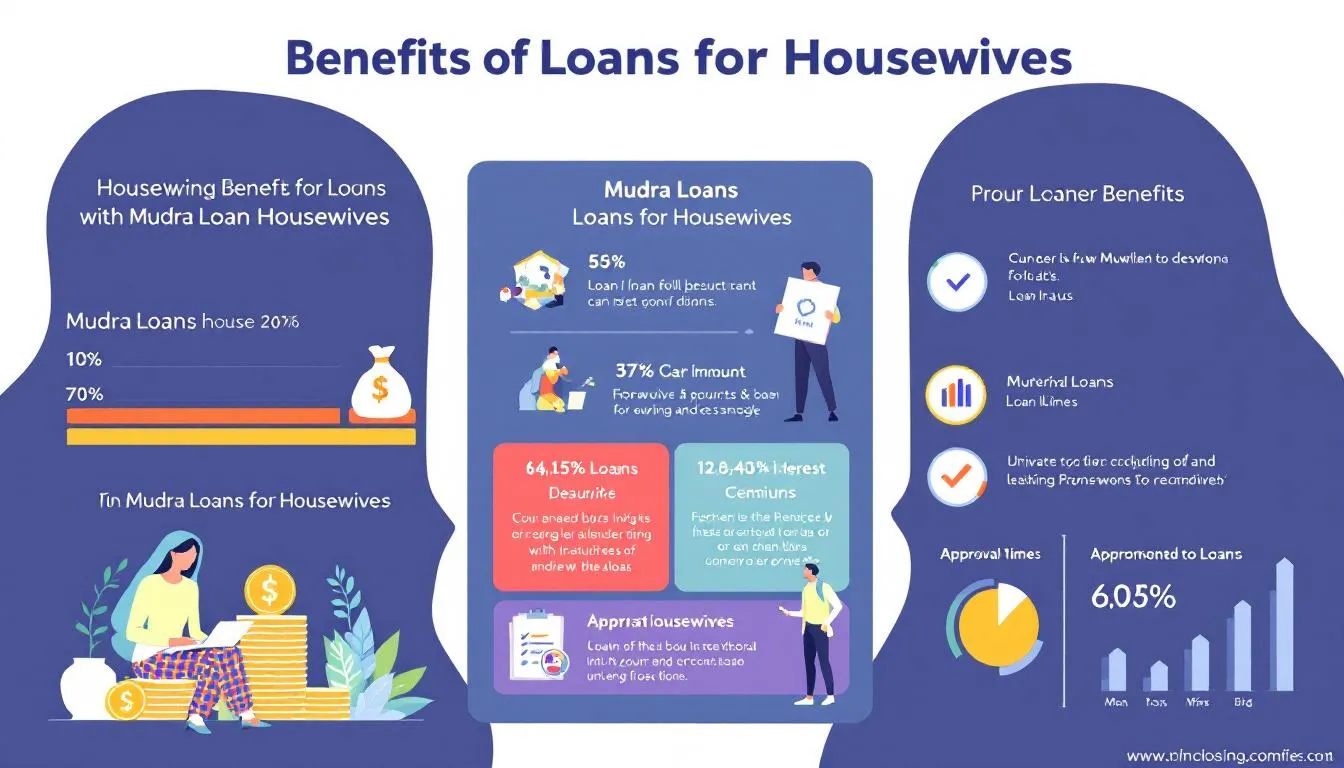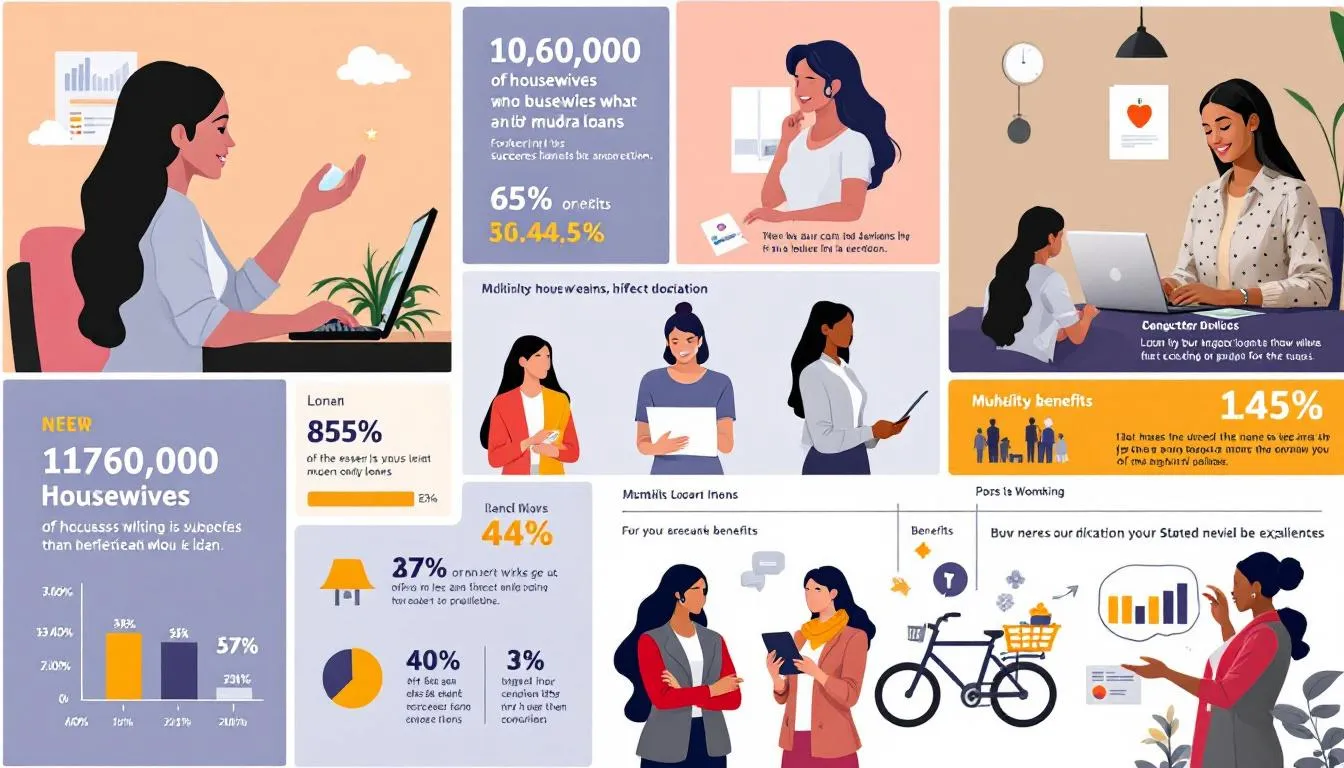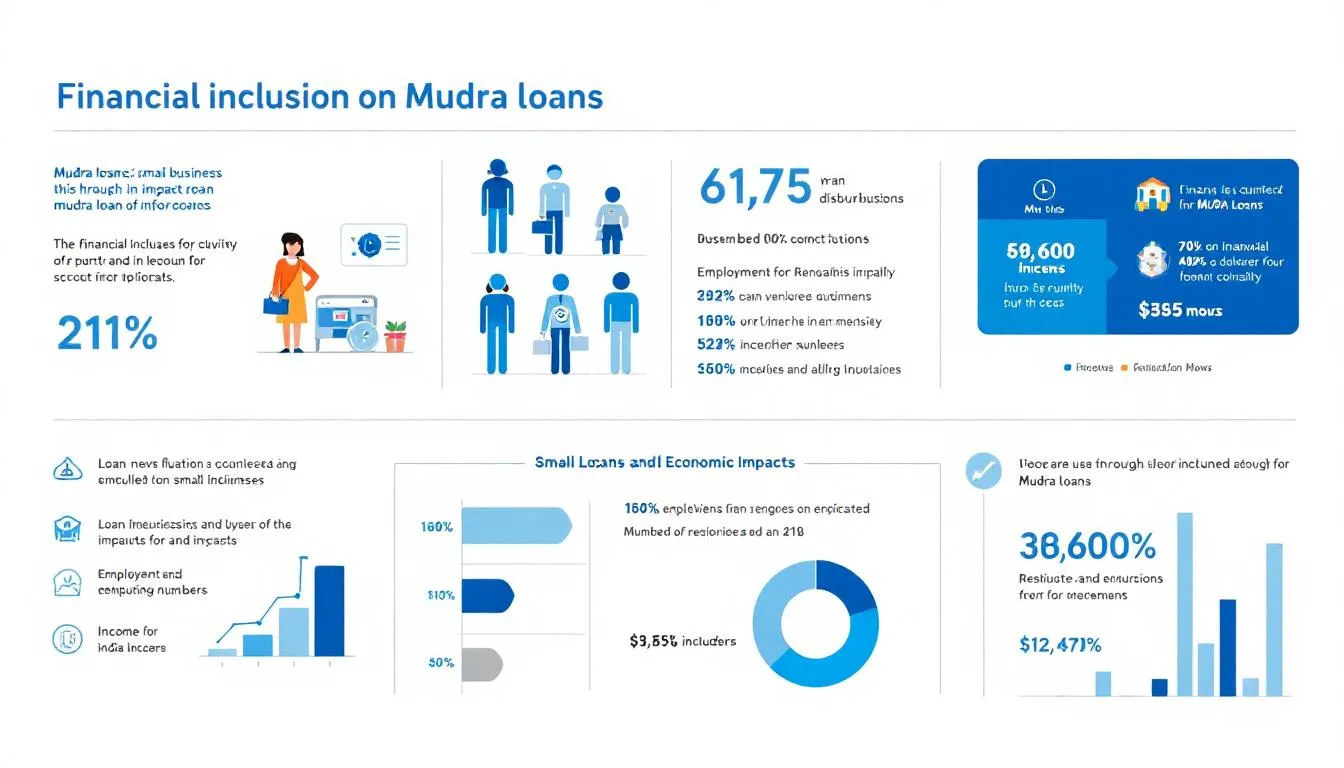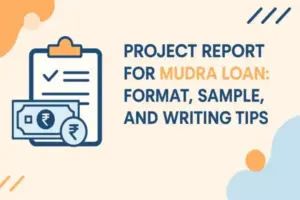Mudra loans provide housewives with the financial support necessary to start small businesses. This guide explains the eligibility, benefits, and application process for housewives interested in securing a Mudra loan for housewives.
Key Takeaways
- Mudra loans are specifically designed to empower housewives to become entrepreneurs, providing financial support across different business stages and promoting gender equality.
- The application process for Mudra loans requires housewives to meet specific eligibility criteria and gather necessary documentation, along with crafting a detailed business plan to enhance their chances of approval.
- Apart from competitive interest rates and flexible repayment options, Mudra loans offer additional incentives for women, such as interest rebates and support schemes, encouraging their participation in the economy.
Introduction to Mudra Loans
Mudra loans are a unique form of financial assistance introduced by the Micro Units Development and Refinance Agency (MUDRA) as part of the Pradhan Mantri Mudra Yojana (PMMY). Launched by the Hon’ble Prime Minister on April 8, 2015, this scheme was designed to provide easy access to loans of up to ₹10 lakh for non-corporate, non-farm small and micro enterprises across both rural and urban areas of India. The primary goal of Mudra loans is to drive economic growth by supporting budding entrepreneurs, especially women, in realizing their business aspirations. By offering financial support to micro enterprises, the scheme helps foster entrepreneurship, create jobs, and empower women entrepreneurs to participate actively in the nation’s economic development. The mantri mudra yojana pmmy has become a cornerstone for those seeking to start or expand their businesses, ensuring that financial barriers do not stand in the way of growth and innovation.
Introduction to Mudra Loans
Mudra loans are a unique form of financial assistance introduced by the Micro Units Development and Refinance Agency (MUDRA) as part of the Pradhan Mantri Mudra Yojana (PMMY). Launched by the Hon’ble Prime Minister on April 8, 2015, this scheme was designed to provide easy access to loans of up to ₹10 lakh for non-corporate, non-farm small and micro enterprises across both rural and urban areas of India. The primary goal of Mudra loans is to drive economic growth by supporting budding entrepreneurs, especially women, in realizing their business aspirations. By offering financial support to micro enterprises, the scheme helps foster entrepreneurship, create jobs, and empower women entrepreneurs to participate actively in the nation’s economic development. The mantri mudra yojana pmmy has become a cornerstone for those seeking to start or expand their businesses, ensuring that financial barriers do not stand in the way of growth and innovation.
The Role of Mudra Loans in Empowering Housewives

Categorization of Loans: Mudra loans are divided into three types—Shishu loans (up to ₹50,000), Kishore (₹50,001 to ₹5 lakh), and Tarun loans (₹5 lakh to ₹10 lakh)—to support various stages of business growth.
Each beneficiary micro unit can apply for a loan amount based on their business stage, with the Shishu category offering a maximum loan amount of Rs 50,000 as an entry-level option for startups and new micro-businesses.
Women Beneficiary Ratio: Over 65% of Mudra loan beneficiaries are women, highlighting the scheme’s focus on promoting gender equality and economic participation.
Empowerment and Independence: Mudra loans empower housewives to become entrepreneurs, fostering financial independence and breaking down societal barriers.
Economic Growth Contribution: These loans contribute significantly to economic growth by unlocking the potential of women’s workforce.
Job Creation: Supporting women entrepreneurs through Mudra loans aids in job creation, benefiting local communities and transforming economic landscapes.
Focus on Micro Enterprises: The scheme targets non-corporate, non-farming micro enterprises, aligning with the business aspirations of housewives and enabling diverse business opportunities.
Key Features of the Mudra Scheme
The Mudra scheme stands out for its borrower-friendly features, making it an ideal choice for small businesses and micro enterprises. Here are some of the key features:
- Three Loan Categories: Mudra loans are available under three categories—Shishu (up to ₹50,000), Kishor (₹50,001 to ₹5 lakh), and Tarun (₹5 lakh to ₹10 lakh)—catering to different stages of business development.
- Competitive Interest Rates: The interest rates for Mudra loans are set by the lending institution, ensuring they remain competitive and affordable for entrepreneurs.
- Flexible Repayment Terms: Borrowers can choose repayment schedules that align with their business cycles, making it easier to manage cash flow.
- No Collateral Required: One of the most attractive features is that Mudra loans do not require any collateral or security, making them accessible to a wider range of entrepreneurs.
- Support for Micro Enterprises: The scheme is specifically tailored to meet the needs of micro enterprises and small businesses, helping them access the funds necessary for growth.
These features collectively make Mudra loans a practical and accessible solution for entrepreneurs looking to start or expand their businesses without the burden of high interest or stringent security requirements.
Key Features of the Mudra Scheme
The Mudra scheme stands out for its borrower-friendly features, making it an ideal choice for small businesses and micro enterprises. Here are some of the key features:
- Three Loan Categories: Mudra loans are available under three categories—Shishu (up to ₹50,000), Kishor (₹50,001 to ₹5 lakh), and Tarun (₹5 lakh to ₹10 lakh)—catering to different stages of business development.
- Competitive Interest Rates: The interest rates for Mudra loans are set by the lending institution, ensuring they remain competitive and affordable for entrepreneurs.
- Flexible Repayment Terms: Borrowers can choose repayment schedules that align with their business cycles, making it easier to manage cash flow.
- No Collateral Required: One of the most attractive features is that Mudra loans do not require any collateral or security, making them accessible to a wider range of entrepreneurs.
- Support for Micro Enterprises: The scheme is specifically tailored to meet the needs of micro enterprises and small businesses, helping them access the funds necessary for growth.
These features collectively make Mudra loans a practical and accessible solution for entrepreneurs looking to start or expand their businesses without the burden of high interest or stringent security requirements.
Eligibility Criteria for Housewives
Citizenship and Age: Women must be Indian citizens aged 18 or older.
Identity Proof: Housewives must provide valid identity proof.
Address Proof: Submission of address proof is required.
Financial Documents: Necessary financial documents must be submitted to establish eligibility.
Loan Category Selection: Housewives should identify the specific loan category—Shishu, Kishore, or Tarun—that best matches their business objectives and financial requirements.
Business Sector Alignment: The loan should align with the business nature, whether manufacturing, trading, or service sectors.
Purpose: Meeting these criteria unlocks the financial support housewives need to turn their entrepreneurial dreams into reality.
Sectors Covered Under the Mudra Scheme
The Mudra scheme is designed to support a diverse range of sectors, ensuring that micro enterprises in various industries can benefit from financial assistance. Eligible sectors include manufacturing, trading, and services, with a special emphasis on areas like food processing. The scheme aims to provide financial support to businesses that drive local economies and create employment opportunities. Importantly, Mudra loans also promote gender equality by encouraging women entrepreneurs to start and grow their own businesses, offering them the financial backing needed to succeed in traditionally male-dominated industries. Whether it’s a small trading business, a service-oriented venture, or a food processing unit, the Mudra scheme is committed to empowering entrepreneurs and supporting the growth of micro enterprises across India.
Sectors Covered Under the Mudra Scheme
The Mudra scheme is designed to support a diverse range of sectors, ensuring that micro enterprises in various industries can benefit from financial assistance. Eligible sectors include manufacturing, trading, and services, with a special emphasis on areas like food processing. The scheme aims to provide financial support to businesses that drive local economies and create employment opportunities. Importantly, Mudra loans also promote gender equality by encouraging women entrepreneurs to start and grow their own businesses, offering them the financial backing needed to succeed in traditionally male-dominated industries. Whether it’s a small trading business, a service-oriented venture, or a food processing unit, the Mudra scheme is committed to empowering entrepreneurs and supporting the growth of micro enterprises across India.
Popular Business Ideas for Housewives
Home-Based Food Service: Starting a home-based food service allows housewives to leverage their cooking skills by selling meals or catering for events. This business taps into the growing demand for homemade food while offering flexibility to manage both home and business responsibilities.
Custom Tailoring Services: Offering tailoring services from home caters to clients’ clothing needs, including alterations and embroidery, providing a lucrative and creative business opportunity.
Boutique Business: Starting a boutique enables housewives to showcase their fashion sense by selling trendy outfits and custom designs, combining profitability with creative expression.
Beauty Services: Providing makeup and hairstyling services meets a constant demand and offers a flexible business option that can be managed alongside household duties.
Handicraft Business: Creating and selling unique handmade products taps into the market for artisanal goods and allows housewives to monetize their crafting skills.
Online Tutoring: Offering tutoring services online leverages educational skills and provides a convenient way to earn income from home.
Freelance Writing: Engaging in freelance writing allows housewives to utilize their language and communication skills to earn through content creation.
Yoga Instruction: Providing yoga classes or instruction caters to the growing wellness market and can be conducted from home or local community centers.
Each of these business ideas capitalizes on the unique skills and interests of housewives, helping them to start successful and flexible ventures.
Benefits of Mudra Loans for Housewives

Lower Interest Rates: Mudra loans typically come with lower interest rates compared to conventional loans, making them more accessible and affordable for women entrepreneurs.
Flexible Repayment Options: These loans offer flexible repayment plans that align with the cash flow needs of small businesses, easing financial management for housewives.
Financial Independence: Mudra loans empower housewives to invest in their own ventures, fostering creativity and entrepreneurship through enhanced financial independence.
Interest Rebate for Women: Many banks provide a 0.25% interest rebate on Mudra loans under the Pradhan Mantri Mudra Yojana, further reducing the cost of borrowing.
Diverse Business Opportunities: With the financial support from Mudra loans, housewives can explore a wide range of business opportunities to fulfill their entrepreneurial dreams.
Support Programs Availability: These loans can be availed through various government and institutional support programs designed to promote women entrepreneurship.
How to Apply for a Mudra Loan as a Housewife
Applying for a Mudra Loan involves several key steps that housewives must follow to ensure a smooth process. These steps include:
- Self-assessment
- Preparing a business plan
- Choosing the right lender
- Gathering required documents
- Submitting the loan application.
The scheme launched by the government in 2015 aims to provide accessible finance to micro and small enterprises, with various finance sector institutions such as cooperative banks and small finance banks playing a significant role as key lenders for Mudra loans.
Each step is crucial in securing the financial assistance needed to kickstart their business ventures, ensuring security for their Future.
Self-Assessment
The first step in applying for a Mudra Loan is self-assessment. Housewives should evaluate their business idea and financial needs before proceeding. Determining the appropriate loan category (Shishu, Kishore, or Tarun) aligns the application with the lender’s requirements.
Lenders will assess the application, business plan, and financial stability, so it’s essential to have a clear understanding of one’s business objectives and funding needs.
Preparing a Business Plan
A well-prepared business plan is often required for housewives seeking financial assistance through Mudra Loans. This plan should include clear objectives, market analysis, and financial projections. Aspiring entrepreneurs should articulate their business aspirations and demonstrate how the loan will be utilized to achieve these goals.
Investing personal funds into the business can demonstrate commitment and enhance the credibility of the loan application. Seeking advice from experienced mentors or financial consultants can also strengthen the business strategy and improve the chances of loan approval.
A comprehensive business plan allows housewives to present a strong case to lenders.
Choosing the Right Lender
Choosing the right lender is a critical step in securing a Mudra Loan. Housewives can consider various financial institutions, including traditional commercial banks, microfinance institutions, and non-banking financial companies (NBFCs). It’s beneficial to read reviews or seek recommendations to find lenders specializing in Mudra loans and financial institution options.
Selecting the right lender ensures that housewives get the best terms and support for their bank business as a borrower.
Gathering Required Documents
Gathering the required documents is an essential part of the loan application process. Key documents include:
- Aadhaar card
- PAN card
- Residential proof
- Business plan
These documents verify the identity and business proposal of the applicant. The lending institution may have specific requirements that differ. Additionally, the type of Mudra loan being applied for can also influence these requirements.
Establishing community support centers can facilitate housewives in gathering necessary documents and information.
Submitting the Loan Application
The final step is submitting the loan application. Begin by:
- Obtaining the Mudra loan application form from your chosen lender.
- Carefully filling out the form with accurate and complete information.
- Preparing all necessary supporting documents.
- Submitting the completed application to the lender.
Once your loan is approved, you will need to pay back the loan according to the agreed repayment schedule, which includes both principal and interest.
Following up with the lender can help confirm the status of your application.
Success Stories of Housewives Benefiting from Mudra Loans

Mudra loans have transformed the lives of many housewives, turning their entrepreneurial dreams into reality. Take the story of Sarita Devi, who used a Mudra loan of Rs. 30,000 to start dairy farming, creating a sustainable income for her family. Similarly, Rajani Sharma secured a Rs. 2,00,000 loan to open her clothing boutique, boosting local employment and fashion culture. These success stories exemplify how Mudra loans facilitate self-reliance and community impact.
Neha Singh leveraged a Rs. 7,00,000 loan to establish a food processing unit, preserving traditional snacks and generating jobs for women. These stories not only illustrate individual success but also highlight the broader impact of women-led businesses on local economies. Mudra loans provide critical financial support that helps women entrepreneurs innovate and create jobs within their communities.
Financial Inclusion and Economic Impact

Financial Inclusion: Mudra loans promote financial inclusion by enabling women to establish credit histories and improve their financial standing.
Gender-Inclusive Approach: The gender-inclusive approach of Mudra loans has helped integrate women into the formal financial system, enhancing their economic stability.
Economic Growth Driver: By supporting women entrepreneurs, these loans drive economic growth and challenge traditional gender roles.
Household and Community Contribution: The financial support from Mudra loans allows housewives to contribute to their households and local economies, fostering community growth.
Wide Reach: Mudra loans facilitate the entry of over 3.5 crore women entrepreneurs into the business landscape, promoting greater economic participation.
Job Creation: Women-led businesses supported by Mudra loans create job opportunities, significantly benefiting local economies.
GDP Impact: Mudra loans contribute to economic growth and increase GDP by empowering women to start and expand their businesses.
Challenges and Solutions for Housewives Applying for Mudra Loans
Limited Access to Financial Resources: Housewives often face challenges due to limited access to financial resources and lack of information about the loan application process.
Balancing Responsibilities: Managing domestic duties alongside business aspirations can be overwhelming, making it difficult for housewives to focus on loan applications.
Gender Biases: Gender biases during the loan approval process may affect housewives’ confidence and create hurdles in securing loans.
Technical Literacy Barriers: A lack of technical literacy can hinder effective use of digital platforms for applying for loans and managing business operations.
Documentation Requirements: Some lenders may require additional documentation such as business registration or licenses, and document requirements can vary by lender.
Mentorship and Peer Support: Establishing a strong network of mentors and peer groups can help housewives navigate challenges and gain valuable guidance.
Financial Management: Separating personal and business finances is crucial for maintaining clarity and transparency in financial management.
Application Follow-Up: Regularly following up with the lender after submitting the application helps housewives stay informed about the status and progress of their loan approval.
Tips for Maximizing Mudra Loan Benefits

- Allocate Funds According to Business Plan: Make sure the disbursed funds are allocated according to the business plan.
- Use Funds for Specified Purposes: Use the funds strictly for the specified business purposes.
- Maintain Proper Records: Maintain proper records of expenditure to ensure transparency and accountability.
- Timely Repayments: Make timely payments and adhere to the repayment schedule to maintain a good credit history.
- Keep Copies of Documents: Keep copies of the application and related documents for personal records and future reference.
Following these tips helps housewives make the most of Mudra loans, aiding local communities and contributing to economic development.
Can Housewives Get a Mudra Loan?
Yes, housewives can get a Mudra loan if they intend to start a micro businesses enterprise. Examples of businesses include:
- Home tiffin services
- Tailoring
- Handmade crafts
- Beauty parlors
- Homemade pickles or papads.
No collateral is needed, but housewives must show:
- Intent and a basic plan of the business
- Banks may ask for KYC, Aadhaar, and residence proof
- Income proof is not always required for the Shishu category (up to ₹50,000)
Special Incentives for Women under Mudra
Mudra Loans offer special incentives for women entrepreneurs, including:
- A 0.25% interest rebate on loans in many banks.
- The Mahila Uddyami Scheme, which provides special support for women entrepreneurs with backing from SIDBI, NRLM, and women SHGs.
- Banks may prioritize applications by women for small-ticket loans, ensuring they get the financial support they need to succeed.
Can College Students Get a Mudra Loan?
College students are not automatically eligible for Mudra loans simply by being students, but they can apply if they have a clear business idea intended for income generation. For example, startups in:
- Digital services
- App development
- Dropshipping
- Home tuitions qualify. The loan must be used strictly for an income-generating activity.
In some cases, parental support or a co-applicant may be required. Students should also prepare a business proposal or plan to support their application.
Summary
Mudra loans under the Pradhan Mantri Mudra Yojana offer housewives across India a remarkable opportunity to achieve financial independence and entrepreneurial success. By understanding the eligibility criteria, exploring viable business ideas, and following the application process diligently, housewives can transform their aspirations into tangible businesses. These loans not only empower individual women but also contribute to broader economic growth, job creation, and financial inclusion. With the right guidance and support, housewives can harness the full potential of Mudra loans to build a better future for themselves and their communities.
Frequently Asked Questions
Are housewives eligible for Mudra loans?
Yes, housewives are eligible for Mudra loans, provided they plan to initiate a micro-enterprise. This financial support can help empower them to pursue entrepreneurial ventures.
What types of businesses can housewives start with Mudra loans?
Housewives can start various businesses with Mudra loans, such as home tiffin services, tailoring, beauty parlors, handmade crafts, and homemade food products. These options provide a flexible way to earn income while managing home responsibilities.
What documents are required to apply for a Mudra loan?
To apply for a Mudra loan, you will need to provide your Aadhaar card, PAN card, proof of residence, and a detailed business plan. These documents are crucial for processing your application effectively.
Are college students eligible for Mudra loans?
Yes, college students are eligible for Mudra loans if they possess a viable business idea aimed at generating income. It is essential to demonstrate the potential for profitability to qualify.
What special incentives are available for women under the Mudra scheme?
Women under the Mudra scheme benefit from a 0.25% interest rebate and support through the Mahila Uddyami Scheme, which is backed by SIDBI, NRLM, and women Self-Help Groups (SHGs). This initiative underscores the commitment to empowering women entrepreneurs.
- Rejected Mudra Loan – What to Do Next? Appeal Process Explained
- Mudra Loan for Used Vehicle: Benefits, Interest Rates, and Eligibility Criteria
- Is the Mudra Loan Subsidy Real or Fake? Get the Facts Here
- Get Your Mudra Loan Approved: Write a Perfect Project Report with This Guide
- Mudra Loan Without CIBIL Score: How to Qualify and Apply
- Mudra Loan Without PAN Card: Eligibility & Application Process Explained
- Secure Your Future: Mudra Loan for Salaried Person Explained
- Mudra Loan for Senior Citizens or Retired Persons – Eligibility, Benefits & Myths
- Mudra Loan for Disabled Persons: Eligibility, Interest Rates, and Benefits
- Best Tips for Securing a Mudra Loan for SC ST Applicants
- Top Benefits of Mudra Loan for Women Entrepreneurs
- How to Get Mudra Loan for Franchise Business in India
- Mudra Loan for Home Business: How to Apply and Benefits
- Can I Get Mudra Loan Without GST or Udyam Registration?
- Mudra Loan for Amazon Seller, Dropshipping, and Affiliate Marketing – Is It Possible?
- Best Mudra Loan for Housewives – Empowering Women Across India
- Top Reasons for Mudra Loan Rejected and How to Fix Them
- Best Business Idea Under Mudra Loan 5 Lakh for 2025
- Mudra Loan for Used Machine: Eligibility, Interest Rates & Benefits



















